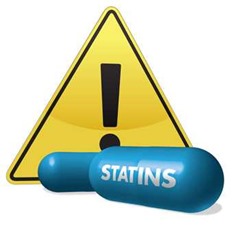 Print This Post
Print This Post
Statin Drugs Found To Cause Increased Parkinson’s Risk
Written by Wellness Club on November 15, 2016 – 12:27 pm -This is Part IX of a multi-part series that discusses the statin drug controversy. Please find links to the rest of this series at the end of this article.
By Nurse Mark
Dr. Myatt and I have been warning of the dangers of statin drugs for many years.
Are we totally against the use of these drugs? Of course not!
Like most drugs, there are times when the use of statin drugs can be life-saving – but they are rare.
For most people, a prescription for a statin drug is more about making the doctor feel good and making the shareholders of the drug companies happy.
In our previous articles we have alluded to an increased risk of Parkinson’s occurring with decreased cholesterol levels, and that normal to higher cholesterol levels are protective from Parkinson’s. Now, research data from a surprising source is showing that people taking statin drugs are at an increased risk of developing Parkinson’s. This is in direct opposition to earlier studies that had show a weak protective effect from statins against this feared disease.
So, why is this new data so surprising?
Well, most medical research studies of this sort rely on the review of medical records, or patient surveys or questionnaires as the source of data. This study relied on a data source far larger and possibly much more accurate.
Why more accurate? Well, is there anyone more accurate and precise and careful than an actuary for an insurance company? These are the people who use their data to predict, almost eerily sometimes, the life expectancy and causes of death of the people they insure. They are spooky accurate – they have to be – since the profitability of the insurance company relies on their skills at predicting these things.
Dr. Xuemei Huang, MD, PhD, vice chair for research at Penn State College of Medicine, in Hershey, Pennsylvania decided to mine this mother lode of detailed information in order to do her research. She and her team looked at data from the MarketScan Commercial Claims and Encounters database, an incredible 30,343,035 people aged 40 to 65 years between January 1, 2008, and December 31, 2012 and found that out of those over 30 million people 21,559 had a diagnosis of Parkinson’s disease.
When they looked at the data for those 21,559 people with Parkinson’s they found the use of cholesterol-lowering drugs, including both statins or nonstatins, was associated with a significantly higher prevalence of Parkinson’s disease. As they further refined their analysis they found that both statins and nonstatin cholesterol-lowering drugs were associated with Parkinson’s disease, but over time only statins remained significantly associated with increased Parkinson’s risk.
Now the question must be asked: Is it the higher cholesterol that protects from Parkinson’s, and that protection is being taken away by the drugs, or is it something about the drugs themselves that is causing this increased risk for Parkinson’s?
"We know that overall weight of the literature favors that higher cholesterol is associated with beneficial outcomes in Parkinson’s disease, so it’s possible that statins take away that protection by treating the high cholesterol," Dr Huang explained.
"Another possibility is that statins can block not only the cholesterol synthesis but also synthesis of coenzyme Q10 that is essential for cell function."
We have warned for years that anyone taking statins must (not just should – must) be supplementing a high quality CoQ10. Even conventional medicine has conceded that statins deplete CoQ10.
Dr. Huang went on to explain:
"The increased risk of Parkinson’s is more likely when statins are first used, so we think it could be that the statins ‘unmasked’ Parkinson’s," Dr. Huang said. "Namely, people may be already on the way to Parkinson’s and when they use statins to control the high cholesterol, it gives Parkinson’s a push to reveal its clinical symptoms.
"Based on this data, we think caution should be taken before advancing statins to be protective of Parkinson’s disease," she added. "The data are not clear yet."
While Dr. Huang, in her abundance of scholarly and scientific caution, says the data are not clear yet, it is clear enough for us here at the Wellness Club.
In our opinion, statins certainly may have a place in the treatment of some people with certain high cholesterol conditions. We also believe that conventional medicine, at the urging of Big Pharma, has set unhealthy low levels for cholesterol, leading doctors to vastly over-prescribe this potentially dangerous drug.
Until more is known about the statin / Parkinson’s relationship we would urge anyone with Parkinson’s disease, or with a family history of PD to think very, very carefully about using a statin drug.
And of course, no one should ever use a statin drug without supplementing with CoQ10.
Part VIII can be found here: Statin Drugs: The Evil Of A 20 Billion Dollar Industry
Part VII can be found here: Statin Drugs Proven To Increase Risk Of Cataracts
Part VI can be found here: Statins Proven To Cause Increased Injuries
Part V can be found here: Saturated Fats Are NOT Bad For You – Here’s PROOF
Part IV can be found here: Cholesterol: Life-Giving Or Life-Threatening?
Part III can be found here: New Research Into Statin Drug Memory Loss
Part II can be found here: Trade Your High Cholesterol For Diabetes!
Part I can be found here: Lower Your Cholesterol – Lose Your Marbles?
References:
Medscape Medical News, Statin Use Linked to Increased Parkinson’s Risk, Nancy A. Melville, October 26, 2016
http://www.medscape.com/viewarticle/870996
Related Posts
 Print This Post
Print This Post

Posted in Cholesterol, Drugs and Alternatives, Mental Health | Comments Off





































